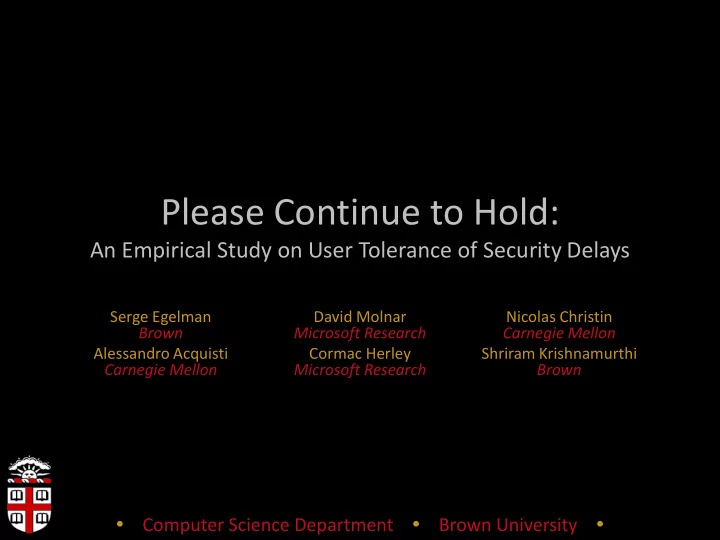

Please Continue to Hold: An Empirical Study on User Tolerance of Security Delays Serge Egelman David Molnar Nicolas Christin Brown Microsoft Research Carnegie Mellon Alessandro Acquisti Cormac Herley Shriram Krishnamurthi Carnegie Mellon Microsoft Research Brown Computer Science Department Brown University Serge Egelman Computer Science Department Brown University
Motivations • Security mitigations usually entail time costs – Designers usually try to hide these from users – Is this really the best way? • Behavioral economics literature tells us people put up with delays when they are explained E. Langer, A. Blank, and B. Chanowitz. The Mindlessness of Ostensibly Thoughtful Action: The Role of “ Placebic ” Information in Interpersonal Interaction . Journal of Personality and Social Psychology, 36(6):635 – 642, 1978. Serge Egelman Computer Science Department Brown University 2
Security Explanations • Are security explanations any different? – Does it matter how plausible the security explanation is? – “For your security…” …passengers in …outside food steerage cannot or drink is use the first forbidden. class lavatory. Serge Egelman Computer Science Department Brown University 3
• Marketplace for crowd-sourcing – Great resource for human subjects experiments – The challenge is creating a study doable online • Users have the purest of motivations… – …cold hard cash change – Incentive to cheat when possible • What does cheating tell us? – Are people less likely to cheat when given a “security” explanation? Serge Egelman Computer Science Department Brown University 4
Methodology • Create a Turk task that features a delay • Hypothesis: People will cheat significantly less when they believe a delay is for security purposes • If task is clearly for research, people may be less likely to cheat – Task needs to look like other non-research tasks – E.g., transcribing documents, image tagging, etc. Serge Egelman Computer Science Department Brown University 5
Introducing SuperViewer Serge Egelman Computer Science Department Brown University 6
Study Conditions • Before viewing each page, a progress bar forces users to wait approx. 10s – We examined whether the explanation for this progress bar had an impact on rates of cheating • Control: No progress bar • Loading: Bar labeled “Loading” • Security: Bar labeled “Performing security scan” • SecPrimed: Same as above, but with an intro page warning about new security features and the danger of embedded PDF viruses Serge Egelman Computer Science Department Brown University 7
Turk Task Serge Egelman Computer Science Department Brown University 8
Serge Egelman Computer Science Department Brown University 9
Serge Egelman Computer Science Department Brown University 10
Results 120 P < 0.035 100 80 Read All 60 Read Some Read None 40 20 0 Control SecPrimed Loading Security Serge Egelman Computer Science Department Brown University 11
Open Questions • What about a detailed non-security explanation? – Loading condition did not offer a concrete reason • What is the role of security priming? – SecPrimed offered both the security priming and the security explanation for the delay • What about a non-security prime with associated delay? – SecPrimed had a prime that supported the delay Serge Egelman Computer Science Department Brown University 12
Additional Conditions • AdjPrimed: Bar labeled “Adjusting document width” and an intro page supporting the delay • Adjusting: Same as above, but no intro (i.e., priming) • AdjSecure: Same as Adjusting , but using the intro from the SecPrimed condition • Downloading: Bar labeled “Downloading document” • After additional condition, N = 800 Serge Egelman Computer Science Department Brown University 13
Updated Results 120 Read All P < 0.036 Read Some 100 Read None 80 60 40 20 0 Serge Egelman Computer Science Department Brown University 14
Additional Data • No differences in accuracy between conditions – Differences between cheaters and non-cheaters (p<0.0005) • No differences in read time between conditions – Cheaters spent significantly less time (p<0.0005) • Control subjects significantly more likely to revisit pages of the document (p<0.007) Serge Egelman Computer Science Department Brown University 15
Exit Survey • Offered participants $0.50 to take exit survey – Received 410 valid responses – 82 corresponded to cheaters (20%) • Participants noticed delays: – 34% explicitly mentioned the page load time – Significantly fewer in Control (p<0.005) • Participants in both security primed conditions mentioned a known danger (p<0.006) – So why did only one condition tolerate the delay? Serge Egelman Computer Science Department Brown University 16
Conclusions • Security priming alone does not work – The cause of the delay must point to a threat • Highlighting the delay alone does not work – The danger must be understood • Participants were tolerant of the delay because they felt they were being protected from a known danger Serge Egelman Computer Science Department Brown University 17
Future Work* • Measuring returned tasks • Varying wait times • Providing a “cancel” button • Examining framing effects *We totally plan to do some of this! Serge Egelman Computer Science Department Brown University 18
Fin Computer Science Department Brown University Serge Egelman Computer Science Department Brown University
Recommend
More recommend